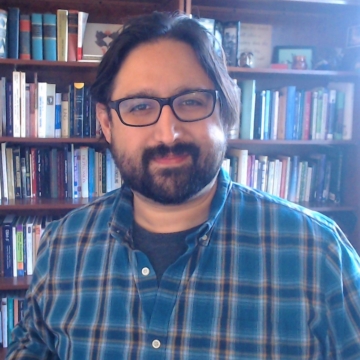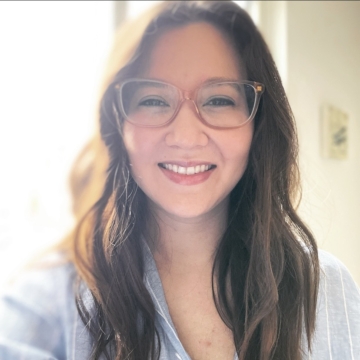Daniel Gutierrez, the Vera W. Barkley Associate Professor of Counselor Education, along with collaborator Stephanie Dorais Ph.D. ’21, assistant professor in counselor education at Kean University, are exploring the role of contemplative practices in promoting prosociality and resilience among mental health counselors. The two-year project is being funded by a $100K PEACE Grant from the Mind & Life Institute, an organization co-founded by the Dalai Lama to bridge science and contemplative wisdom in order to foster human flourishing.
At the heart of the project, says Gutierrez, is a desire to help counselors leverage meditation as a resource for their own wellness and as a means of increasing empathy and compassion in their interactions with clients.

“Many counselors are struggling now with the stressors of the pandemic, racial battle fatigue and internalized discrimination,” says Gutierrez. “In human society, spirituality and contemplation have long been used as protective measures, as a resource for coping with stress. With this project, we’re hoping to gain a greater understanding of how meditation helps counselors strengthen their own empathy and resilience.”
The two scholars, who began collaborating while Dorais was a doctoral candidate at William & Mary, have published previous studies that demonstrated the positive effect of meditative practice on resilience, hope, mindfulness, transcendence and mood. These studies also showed a significant positive relationship between nondual awareness, which is a state of consciousness transcending the “I/Other” perspective, and prosocial behavior, or the desire to pursue actions benefiting others.
“I believe in the transformative power of spirituality and meditation,” says Dorais. “It led to paradigm shifts in my own personal life, which eventually led me down the road of becoming a counselor. I’ve seen it firsthand transform pain and instill hope, enough to allow people to unleash the compassion and empathy that already lives inside them.”
The new project is a larger-scale experimental design, aiming to further establish the impact of meditation on prosocial outcomes and examine the temporal dynamics of nondual awareness — shedding light on how and when a specific intervention, in this case a centering meditation, impacts an individual.
During the study, a random sample of mental health counselors-in-training will participate in a brief meditation activity called centering, prompted by an instructional video, twice a day for five weeks. The centering activity is designed to promote calmness, bring awareness to what the practitioner holds sacred and increase connection to their true self. Each participant will complete weekly assessments measuring qualities such as empathy, compassion, prosociality, and nondual awareness. They will also participate in a daily diary activity, providing additional information that the researchers hope will offer insight into the patterns and trajectory of change.
A second control group will complete the same assessments without the centering meditation, then the groups will switch, allowing all counselors-in-training to benefit from the intervention.

“This intensive, longitudinal approach is an attempt to study the life that is lived,” says Gutierrez. “Every day, we’re getting these measures, then looking at the data over time to discover if the counselors are becoming more compassionate, altruistic and aware. We can also begin to parse the mechanisms that underlie these changes and figure out what is happening beneath the surface.”
The project will produce a large amount of data, which the researchers will use in a time series analysis to examine the fluctuations and stability of changes in compassion and nondual awareness over time.
The methodology is one of particular interest to Dorais, who began her career in the field of analytics and later found an additional passion for counseling. Her research now lies at the intersection of contemplative science and intensive longitudinal study to examine mechanisms and outcomes related to counseling and thriving.
“Statistical analysts and counselors approach problems with the exact same questions,” says Dorais. “They’re asking what’s going on below the surface? What is happening that we cannot see? This study incorporates statistical analyses that focus on uncovering underlying mechanisms of long-term change. It’s the mathematic parallel to every counselor’s inner thought as they watch a client change and wonder what’s causing the change.”
The researchers believe the project will produce findings that can be applied beyond the field of counseling, as well as contribute to conversations related to diversity, equity and belongingness.
“If we can identify interventions that produce shifts in compassion and empathy, not only can we improve the lives of counselors and their clients, but we can promote compassionate caring and living more broadly,” says Gutierrez. “All people can benefit from a greater sense of humanity so that rather than making quick assumptions about the people they encounter, they can see their fellow humans more deeply and completely.”
Want to try a centering meditation?
Centering meditations, like the one used in the study, are an ancient practice used in many cultures and spiritual traditions. Although often associated with religious prayer, centering can be used as a non-denominational, spiritually-oriented practice. A core concept of centering is the idea of letting go and surrendering.
- Select a word or symbol that you consider spiritually grounding for you and that represents your intention to connect with what is spiritual to you. This could be a name for God or spiritual concepts like Shalom, hope or joy.
- Sit down comfortably with your eyes closed, away from external distractions, and silently introduce your sacred word or symbol.
- You’ll probably notice distracting thoughts emerging or your mind wandering. That’s okay. When you notice yourself becoming distracted, gently reintroduce your sacred word or symbol.
- At the end of your meditation, sit and rest in silence or say a prayer for a few moments.
Studies have shown that incorporating a regular meditative practice into your daily routine is the best way to derive benefits from it. A few minutes per day can make a difference!
